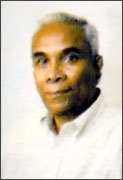Gleanings
Moneragala Then (and even Now)
K. S. Sivakumaran
There are at least three writers in English with their surnames
Punchihewa contributing in this country. One of such writers is P. G.
Punchihewa. Some years back he wrote a novel in Sinhala called Gana Bol
Polowa and had now brought this in English in his own translation titled
The Shattered Earth published by Stamford Lanka (Pvt) Ltd. 336, High
Level Road, Pannipitiya.
Who is P G H? He belonged to the former Ceylon Civil Service and was
the Government Agent of Moneragala District from 1967 to 1970. He
graduated from the University of Peradeniya.

Fine. What is his novel about? The blurb helps us to see what the
writer’s intention had been in writing this docu-fiction depicting the
stark reality in the south-eastern district which comes under the Uva
province.
“The Shattered Earth is the story of the poverty stricken, landless,
innocent peasants of Wellassa who fell victims to the development
oriented policies of the Government, implemented through Colombo based
entrepreneurs backed by the bureaucracy.”
“The story revolves round Kirisanda, a chena cultivator who struggles
hard unsuccessfully to withstand the onslaught of the outside forces”.
To those of us who are not familiar with the terrain and the Sinhala
language, this English version is remarkably authentic. One is even made
to think about the sordid life in the arid soil of the Northern and
Eastern dry zones.
It would be obvious that this book would serves as case study for
sociologists, economists and social- conscious people amongst us, not
excluding the literati.
This column as its title suggests is not a space for full-fledged
piece of literary criticism, book review but an account of the
columnist’s understanding of the material he gleans from that might help
the uninitiated reader to go for the source and enjoy.
Here are some passages gleaned by the columnist at leisure and in
random:
|

P. G. Punchihewa |
In the late 1960s Moneragala was economically and socially was the
poorest. (It may be so even now, the columnist believes)... The b
nearest base hospital was in Badulla, forty miles away. Neither
pipe-borne water nor electricity was available even the district
town...The majority of the population depended on Chena cultivation.
Kirisanda recalled his father saying that, long years ago even before
his grandfather’s time, the jungle, skirting the village had been full
of aralu, bulu and nelli trees said to have been planted by ancient
Sinhalese kings...
Excuse me Sirs, we don’t have any trays here. Not even saucers, just
the cups. It is said that when you visit the bat’s home you must not
look for chairs. You must hang on to the roof.
... of course some say this is a ruse to hoodwink the income tax
people by claiming losses. In any case I have heard that whatever
profits they take on this project will be exempt from tax.
Inside the jungle they found the atmosphere cooler. The leaf cover of
the giant trees was like a great green canopy held over scared a hare
and it ran ahead of them for a short distance and vanished. A group of
monkeys seeing the party got excited, shrieked and fled into the jungle.
Apart from that there was hardly any sound.
I have given excerpts only from the first five chapters out of the 22
in the novel. The book is not only a record of actualities some 45 years
ago prevailing in the Moneragala district but also a commentary on the
social and even political issues of the day.
Reminiscent of Leonard Wolf’s The Village in the Jungle, P G
Punchihewa’s The Shattered Earth is both the jungle eating into village,
and also a shattering of the earth. The writer writes the novel in an
interesting manner and the reader would not be disappointed.
The book also has a useful glossary that would help those who are
totally ignorant of the Sinhala language to understand the context of
the novel. I liked the novel very much.
N.B. In last week’s column an error occurred. The wrong sentence was
“But before that some years back he was gracious enough to speak at the
launch of his book...”
It should read “But before that some years back he was gracious
enough to ask me to speak at the launch of his book.”
To explain: EMGE asked this columnist to speak at the launch of his
book.
[email protected]
|

